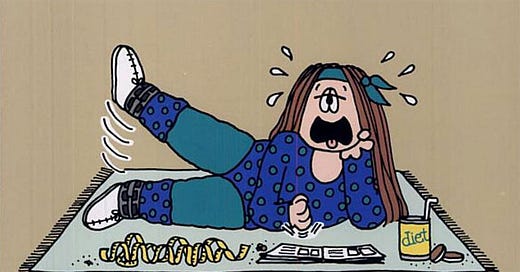Sorry dudes, but menopause affects you too! More on that in a minute.
I can’t believe it’s been a month since the Grief post. I thanked everyone I heard from personally (my heart is still engorged! Not in a scary medical way!) And thanks again to anyone else who took the time to read it.
Aside from making myself cry as I drafted it and GETTING SHINGLES after I published it, it was oddly one of the easiest things I ever wrote: no research required, straight off the dome, and no self-imposed pressure to sound smart or polished, because feelings should be raw and anti-intellectual for max impact.
Since then, I’ve been ovaries-deep in research for a post that turned in a mini-book. Or an e-zine. A digibook. What should we call these things without sounding like a content marketer in 2006?
Introducing…
What? Why?
The simplest answer is that perimenopause hit me like a garbage truck at the same time amazing menopause experts began to pop up in my podcast feeds. The info is fascinating and overwhelming, so after bingeing a bunch of books and articles, (not to mention Miranda July’s delightfully batshit new novel) I had to synthesize it all.
Close second reason for this digibooklette:
Women face a whole new flavor of sexism and lack of support in midlife. Menopause has been misunderstood, stigmatized, and woefully under-researched for most of history. Even though we’re no longer getting burned at the stake for acting witchy — though I’m sure it’s recommended somewhere in Project 2025 — perimenopause is still an isolating experience for women:
We either don’t know enough about it to realize we’re going through it, or we’re afraid to talk about it.
Either way, it stops us from seeking the relief we deserve.
Finally, there are lingering myths about perimenopause treatment after a misleading press release from the Women’s Health Initiative in 2002. I wrote more about the study in the digi-zine but here’s the short story:
For nearly two decades, women who’ve been understandably panicked about getting cancer suffered untenable menopause symptoms instead. This led them to drop out of the workforce, lessened their quality of life while their brains and bodies felt like they were going berserk, and actually put them at risk for developing heart disease, cancer, and osteoporosis later in life.
So, The Perimenopause Field Guide is my way to help the cause for women’s health. If you’re within spitting distance of 40 or know/love/live with someone who is, it’s for you. Seriously, if you’re someone who will never go through perimenopause but live with someone who will, you’ll be going through it another way. Best to know wtf is going on.
This is an interactive version (I could be in the movie Hackers for how Web 1.0 I sound) so anyone can comment or ask questions. It’s a provisional draft for me to catch errors and blindspots before a final version is published. I’d love for you to take a look!
📣 New Subscriber Shout-Outs 📣
I’m sending positive thought beams and deep gratitude to new paid subscribers Meg G., Lucas O.❤️, and David R.! This newsletter is an unpaid side-jiggle for me (jiggle is less serious than a hustle) so in this economy, any amount helps keep me going.
Thanks also to new subs Margaret R., Kayla W., Geoff O., Andrea D., Kasandra S., and Alyssa M. I hope to hear more from you!
Friendly reminder that I thrive on the attention and validation of friends and strangers, so if you know anyone who might enjoy this newsletter about being mid-life, mid-career, and a mid-mom, go ahead and share below!
That’s it for this one. I’m wrapping up another web-bookie™ about how to disagree at work while still getting along and getting shit done. It’s called Pushing Back with Tact and should be ready by mid-August!
Thank you for being a friend








Woooo! Can we start a “was that a hot flash or did my partner just turn the thermostat to 78?” Group chat???
Great writing! And a generous idea to come up with your own guide to it, to help spread the word. Well done, you.